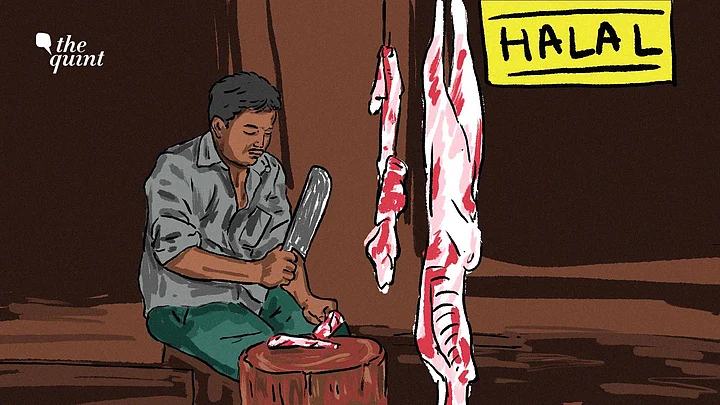Qureshi Khasim Shoaib, president of Karnataka All India Jamiatul Quresh – a butchers and meat traders association – pored over fatwas or Islamic rules for a day, to be on the right side of religion and the state's law while practicing his trade. He checked: Can an animal be slaughtered as per the halal tradition, if Karnataka makes stunning mandatory?
On 3 April the state's Department of Animal Husbandry issued a circular making stunning – rendering animals unconscious before slaughter – mandatory within the limits of Bruhat Bengaluru Mahanagara Palike, the city's municipal corporation. To add to the concern of Muslim butchers in the state, the circular was issued midst calls from various right-wing Hindu groups in Karnataka for a boycott of halal products.
The Animal Husbandry Department's circular was kept in abeyance a day after it was issued. However, halal boycott is still being insisted upon.
Shoaib told The Quint, "Animals can first be stunned and then be slaughtered the halal way." According to Shoaib, the decision to make stunning mandatory did come as a jolt to Muslim meat traders, who were left to wonder whether the rule can be interpreted as a ban on 'halal cut.' "We decided to get clarity on the matter for the benefit of everyone," Shoaib said.
Here's what the Muslim butchers of Karnataka found when they dug deep into both halal and stunning methods.
Why Stunning is Possible as per Islamic Law
According to Karnataka's Jamiatul Quresh Islamic law states that halal cut, or the act of slaughtering an animal by cutting its throat and draining blood, is mandatory. However, as per Halal India Pvt Ltd, the halal way of slaughtering can be performed on a stunned animal, if the animal is alive even after stunning.
Usually, an animal is stunned by passing electricity through its spine to render it unconscious. "In the process, if the animal dies then halal cut cannot be performed. But if the animal remains alive, then it can be slaughtered the halal way," Shoaib said. A fatwa issued by Darul Uloom Deoband, India states the same, he added.
Stunning is believed to prevent animals from feeling the pain of slaughter. "We are ready to stun the animals before slaughter provided the BBMP gives us scientific stunning methods," Shoaib said.
If the BBMP implements the ban without providing facilities, butchers and meat traders in Karnataka will be hit badly, Jamiatul Quresh maintained.
Will BBMP Provide Stunning Facilities?
The Karnataka government has decided to implement mandatory stunning based on Prevention of Cruelty to Animals (Slaughter House) Rules, 2001. As per the rules, "Every slaughter house, as soon as possible, shall provide a separate space for stunning of animals prior to slaughter, bleeding and dressing of the carcasses."
The Animal Husbandry department has periodically been issuing circulars to remind butchers about implementing the law.
Shoaib said, "Of the government approved slaughterhouses within BBMP limits, none have stunning facilities. The state has never implemented this rule because stunning is costly." Even while performing un-Islamic jhatka cut, where the blood of the animal is not drained, stunning will have to be made mandatory as per the rules, Shoaib pointed out.
As per the Karnataka Municipal Corporation Act of 1976, the city administration should provide sound slaughterhouses. The Act states, "The corporation shall provide a sufficient number of places for use as corporation slaughterhouses and the Commissioner may charge and levy such rents and fees for their use as the standing committee may determine..." The BBMP Act, which governs the BBMP limits, replaced the Municipal Corporation Act in 2020. However, even as per the 2020 Act, the BBMP should provide a good number of slaughterhouses.
Currently, there are three slaughterhouses within the BBMP limits, owned and managed by the BBMP.
Licensed slaughterhouses, which are owned by individuals and licensed by the BBMP, are not functional within BBMP limits.
"Licensing is a huge process, and not many people can afford to do this," Shoaib added.
If mandatory stunning is imposed, butchers and meat traders should not be forced to shell-out funds to set up electric stunning equipment, he said. "This will cost a lot. And small-time traders will not be able to afford this," Shoaib said.
The Karnataka Prevention of Slaughter and Preservation of Cattle Act, 2020, which was implemented in January 2021, has already banned purchase, sale and transport of all cattle including cows, bulls and oxen.
How Stunning Could Affect Meat and Poultry Farmers and Traders
Currently most meat sellers trade both poultry and mutton to make a living. "In the case of small animals, stunning could cause sudden death. Meaning, halal cut won't be possible if such death happens," Shoaib said. That is, halal meat sellers may have to throw away animals and birds that die during stunning. This could lead to huge losses, he added.
"In such a case, mandatory stunning would affect only Muslim traders who won't be able to sell non-halal meat," Shoaib said.
Will mandatory stunning further burden meat traders who have been suffering losses since the implementation of the 2020 Act? "If you are a meat seller in Karnataka, you will suffer losses. That is the norm now," Shoaib rued.
